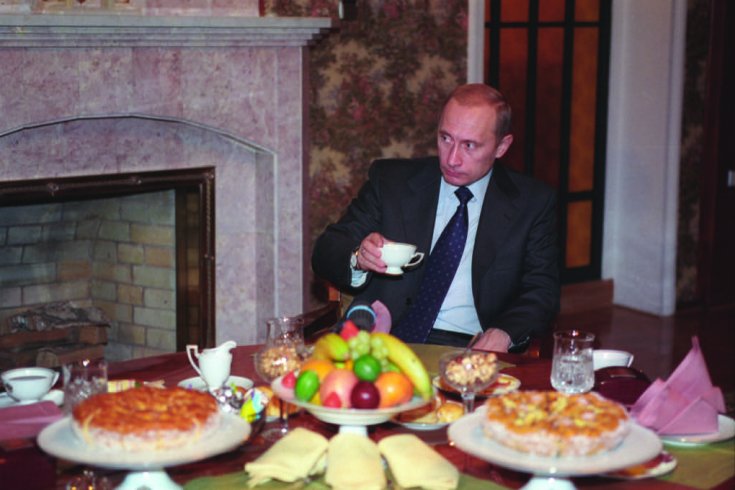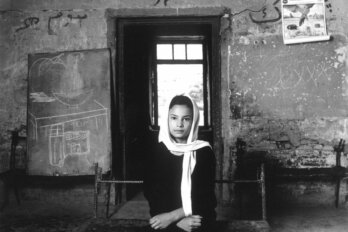
moscow—When he’s in Moscow, Russian President Vladimir Putin lives in a forested compound complete with stables and private swimming pool a half – hour’s drive from the Kremlin. Compared to his neighbours, Putin lives modestly. Just beyond the brick walls surrounding the presidential residence at Novo-Ogaryovo are the homes of Russia’s new rich—lavish estates with steel doors and painted wooden roofs (one even has its own church). All the same, you won’t find Putin strolling through the nearby bowling alleys, supermarkets, and casinos of this exclusive suburb, once a getaway for the Communist Party elite, or inviting a neighbouring billionaire in for a chat. “We don’t actually visit each other around here,” says one resident.
One evening in early September, however, a small group of Western academics and journalists passed through Novo-Ogaryovo’s gates for tea and spongecake with the Russian leader. It was a neighbourly visit. After being bused past armed guards at the residential gates, we went through a quick X-ray body search before entering the neo-baroque mansion—restored from the time of the Romanovs. In what now serves as the vip reception centre, some of us watched the flat-screen TV near the pool table. Others wandered through the gardens, snapping pictures under the gaze of expressionless guards. The oligarchs in the neighbourhood would have been appalled at the breezy security.
The extraordinary three-and-a-half-hour conversation took place just two days after the bloody school hostage-taking by Chechen separatists in southern Russia. But if Putin felt vulnerable after the biggest test of his presidency—what many Russians were already calling their 9/11—he was careful not to show it. He invited his guests, who had been attending a conference funded by ria Novosti (the Russian state press agency) to ask any questions they wanted, “even though there might be some I can’t answer.” In fact, nothing was out of bounds. As white-coated waiters padded around the white reception room refilling our teacups, Putin shifted between charming candour and icy hostility in a performance that recalled the stage-managed displays of temperament favoured by his Soviet predecessors. Some of his most alarming statements made headlines around the world later that week. He railed against Westerners for hypocrisy in pursuing their global war on terror while asking Russia to negotiate with those responsible for the school horror. He compared this to asking Americans to “sit down with Osama bin Laden” and warned that Russia from now on would take an even tougher line with the “bastards who kill schoolchildren.” Then, he switched moods to assert that Russia was still on course toward democratization and a market economy, even though he was well aware that many of his people were not happy with falling living standards. Paraphrasing Mark Twain, he quipped, “Rumours about the death [of our economy] are highly exaggerated.”
The meeting revealed as much about the darkening mood of contemporary Russia as it did the contradictions of its tightly coiled president. We were, of course, a captive audience for Putin’s principal thesis: the perfidy of the West. Actually, we’d been getting the same message since our conference began. Days earlier, we had met in Veliky Novgorod, on the banks of the Volkhov River (two hundred kilometres south of St. Petersburg), with prominent Russian politicians, journalists, and analysts. These were the intelligentsia, who have always had disproportionate weight in Russia. Some had played a prominent role in the bright early years of post-Soviet democracy. But now, thirteen years after the collapse of the Soviet Union, they charged, Westerners were bent on keeping Russia weak and unable to play its proper role in world affairs. As one sternly rebuked us, reeling off a list of Western sins from the expansion of nato to the failure to provide sufficient investment, “We feel betrayed.”
There were lonely voices of protest.
One liberal journalist, in the midst of a heated discussion on the unfolding Beslan tragedy, complained, “As long as we keep blaming others for our problems, there will be more schools blown up.” But the overwhelming consensus of the Russians present was that they had been left to stand alone in the face of forces bent on breaking up their country. How much of this was genuine was hard to tell—intellectuals have once again begun to feel the heavy hand of the state—but it laid the groundwork for what was to follow in the weeks after Putin met with us. In a subsequent announcement, the president stripped Russia’s provincial governors of their electoral authority. Official discouragement of open debate in the press has been stepped up. As it feels increasingly bitter and besieged, Russia has turned away from what its leader considers the excesses of democracy. We left Novo-Ogaryovo shortly after midnight, exhausted and a little bleary. Putin seemed pleased with himself. He shook each of our hands. Then he tossed off a breezy “all the best” (in English) and he was gone.



